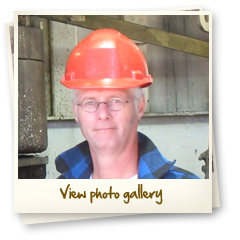

John was born and lives in Nova Scotia, although he has travelled extensively beyond its shores. As a boy he loved to walk the shore in search of rocks, fossils and sea life. He graduated from Saint Mary's University with his BSc in 1973, and later, in 1991, from Dalhousie with his PhD. John's early work as a geologist involved exploration and study of coal deposits. He made many contacts with other researchers through presenting papers at international meetings, and these led to exciting opportunities and lasting friendships. John has spent time at the Smithsonian Institution as a visiting scientist and has been supported by the National Geographic Society. The project that has been important to him has been working for more than 15 years to have the Joggins Fossil Cliffs named a UNESCO World Heritage site, for which he received the Atlantic Geoscience Society's Gesner Medal. John also teaches in the Department of Geology at Saint Mary's University, and is an Adjunct Professor at Dalhousie, where he assists in advising graduate student research.
John is an accomplished documentary photographer with work in the Nova Scotia Art bank and abroad, and has been a long time soccer coach with Halifax County United.
 Q: What is the title of your job and what do you do?
Q: What is the title of your job and what do you do?A: Senior Geologist. I began exploring for coal, gradually moving to work with communities, especially former coal mining towns, to help them build museums and centres to create new economic chances for them. I still provide advice to the government on the use of geological resources in Nova Scotia.
A: Nova Scotia Department of Natural Resources, based in Halifax. (I am also a part-time faculty member at Saint Mary's University where I teach various courses such as History of Life, Global Change (my favourite) and Environmental Geology)
A: Basically 5 days a week, but I do spend a lot of unpaid overtime on key projects, like the World Heritage work on the Joggins Fossil Cliffs.
A: Over the years my work has shifted from 80% field to 80% 'office', but I still get out frequently, and have a lot of freedom where and when I go within the Province.
A: I'm pretty low-tech. I write a lot, and give a lot of talks, so my computer has become an important tool. In the field, my eyes, a hammer and notebook.
A: You require a Bachelor's Degree in Science and a major in geology, but I later worked on my PhD as well, which opens doors for teaching and being invited to conferences and such.
 A: A keen interest in nature, a good observer, and an interest in helping humanity. Being a good communicator is a huge help, although this comes with practice.
A: A keen interest in nature, a good observer, and an interest in helping humanity. Being a good communicator is a huge help, although this comes with practice.
A: $60,000-70,000 The federal government pays more, as does industry, although industry jobs can come and go with the economy, and you must move where the company most needs you.
A: The independence, offering help to people, figuring things out, and teaching others to appreciate the Earth.
A: Independence, getting outside the office, meeting interesting people, travel.
A: Right now with many people my age soon retiring, there are jobs opening in government agencies, and mineral exploration is in its hey day. Groundwater will become a big issue soon.
 Q: How physically demanding is your job?
Q: How physically demanding is your job? A: Moderate, I guess. Field work requires beating it through the woods, through streams, being bitten by flies, or scrambling over boulders on the coast. It helps to be in shape, but you don't have to be Hercules either.
A: Because I love nature, and I didn't have Grade 12 Biology (I also wasn't big on math). My love of fossils was a background reason, although it took me years to 'design' a job that involved paleontology.
A: Spending time as a Visiting Scientist at the Smithsonian Institution, and walking the foggy cliffs of Joggins with local fossil experts – my friends - who live there.
A: Be enthusiastic, and try to create opportunities for yourself as time goes on. And think of what you can do to make the world a better place.
A: The Earth is our only home- get to know her.